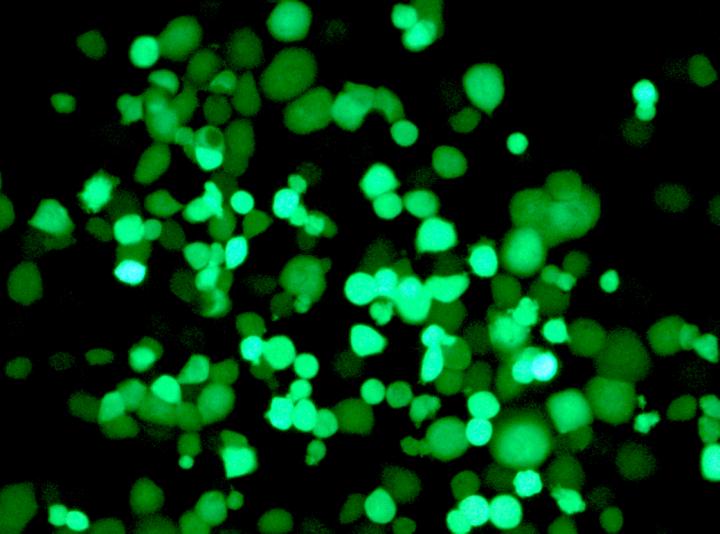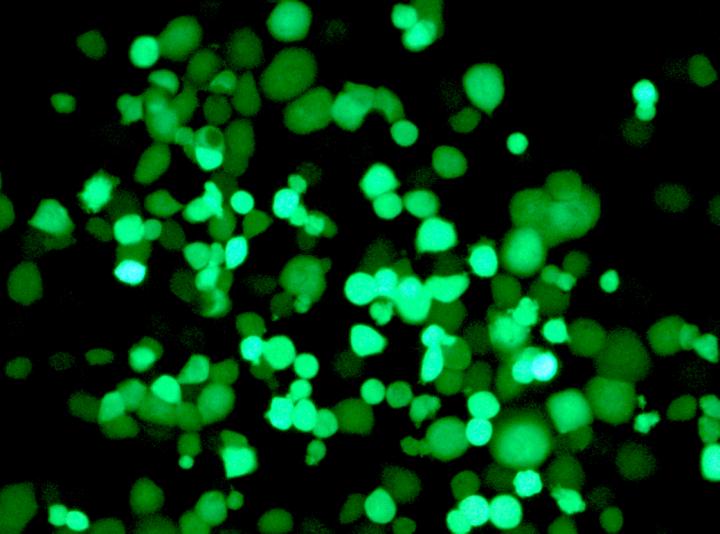
Credit: (IDIBAPS, IRB Barcelona)
Scientists at the IDIBAPS Biomedical Research Institute and at the Institute for Research in Biomedicine (IRB Barcelona) lead a study in which they have designed a new strategy to get genetically modified viruses to selectively attack tumor cells without affecting healthy tissues. The study, published today by the journal Nature Communications, is part of Eneko Villanueva's work for his PhD and it is co-lead by Cristina Fillat, head of the Gene Therapy and Cancer Group at IDIBAPS, and Raúl Méndez, ICREA researcher at IRB Barcelona.
Conventional cancer treatment may cause undesirable side effects as a result of poor selectivity. To avoid them it is important that new therapies can efficiently remove cancer cells and preserve the healthy ones. One of the new approaches in cancer therapy is based on the development of oncolytic viruses, ie, viruses modified to only infect tumor cells. In recent years several studies have been focused on the development of viruses created by genetic engineering to maximize their anticancer effect but, as their potency increases, so does the associated toxicity. Limiting this effect on healthy cells is now the key for the application of this promising therapy.
An innovative and specific approach
In the study published in the journal Nature Communications, researchers from IDIBAPS and IRB Barcelona have developed an innovative approach to provide adenovirus with high specificity against tumor cells. "We have taken advantage of the different expression of a type of protein, CPEBs, in normal and tumor tissues", explains Raúl Méndez from IRB Barcelona.
CPEB is a family of four RNA binding proteins (the molecules that carry information from genes to synthesize proteins) that control the expression of hundreds of genes and maintain the functionality and the ability to repair tissues under normal conditions. When CPEBs become imbalanced, they change the expression of these genes in cells and contribute to the development of pathological processes such as cancer. "We have focused on the double imbalance of two of these proteins in healthy tissues and tumors: on the one hand we have CPEB4, which in previous studies we have shown that it is highly expressed in cancer cells and necessary for tumor growth; and, on the other hand, CPEB1, expressed in normal tissue and lost in cancer cells. We have taken advantage of this imbalance to make a virus that only attacks cells with high levels of CPEB4 and low CPEB1, that means that it only affects tumor cells, ignoring the healthy tissues," says Méndez.
"In this study we have worked with adenoviruses, a family of viruses that can cause infections of the respiratory tract, the urinary tract, conjunctivitis or gastroenteritis but which have features that make them very attractive to be used in the therapy against tumors," explains Cristina Fillat. To do this, it is necessary to modify the genome of these viruses. In the study researchers have inserted sequences that recognize CPEB proteins in key regions for the control of viral proteins. Their activity was checked in in vitro models of pancreatic cancer and control of tumor growth was observed in mouse models.
The oncoselective viruses created in this study were very sophisticated, being activated by CPEB4 but repressed by CPEB1. Thus, researchers achieved attenuated viral activity in normal cells, while in tumor cells the virus potency was maintained or even increased. "When the modified viruses entered into tumor cells they replicated their genome and, when going out, they destroyed the cell and released more particles of the virus with the potential to infect more cancer cells," says Fillat. She adds that, "this new approach is very interesting since it is a therapy selectively amplified in the tumor".
Since CPEB4 is overexpressed in several tumors, this oncoselective strategy may be valid for other solid tumors. Researchers are now trying to combine this treatment with therapies that are already being used in clinical practice, or that are in a very advanced stage of development, to find synergies that make them more effective.
###
Reference article:
Eneko Villanueva, Pilar Navarro, María Rovira-Rigau, Annarita Sibilio, Raúl Méndez, Cristina Fillat
Translational reprogramming in tumor cells can generate oncoselectivity in viral therapies
Nature Communications. DOI: 10.1038/NCOMMS14833
Media Contact
Sònia Armengou
[email protected]
34-934-037-255
http://www.irbbarcelona.org
############
Story Source: Materials provided by Scienmag





